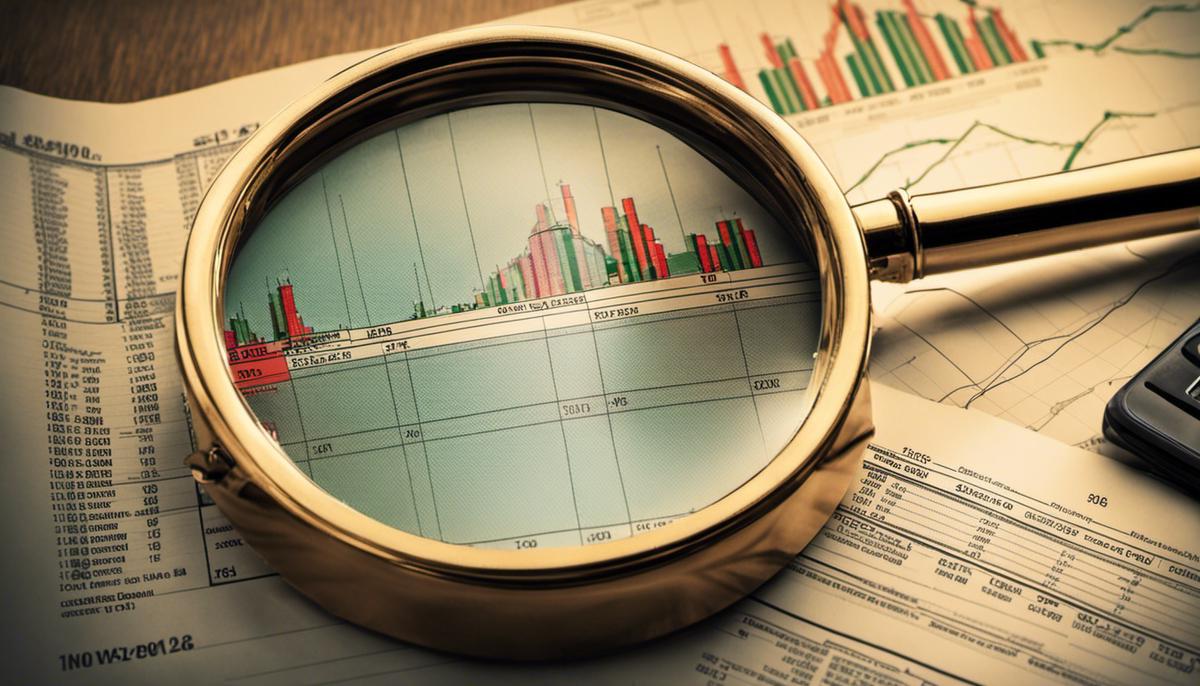Foreign exchange markets, otherwise known as forex markets, are fascinating and complex arenas where fortunes can be made or lost in the blink of an eye. Beneficial to traders for its liquidity, round-the-clock operation, and potential profitability, the forex market nonetheless requires deep understanding, level-headed strategies, and heightened awareness to succeed. This exploration will delve into the intricacies of the forex market from understanding its fundamentals to identifying common mistakes, the paramount importance of a well-structured strategy, risk management, and finally, how to safeguard oneself from prevalent scams and fraud. Hence, our journey would equip you with the necessary knowledge and tools to tread the tumultuous waves of the forex market with care and confidence.
Understanding Forex Market
Understanding the Forex Market
The foreign exchange (Forex) market is a global, decentralized marketplace for trading fiat currencies against one another. With an estimated daily trading volume exceeding $5 trillion, the forex market is by far the world’s largest financial market.
Major currencies traded on the Forex market include the U.S. dollar (USD), Euro (EUR), Japanese yen (JPY), British pound (GBP), and Swiss franc (CHF). The exchange rates between these currencies are largely influenced by different economic and political factors such as inflation, political stability, economic performance indicators, and central bank policies among others.
Key Pitfalls in Forex Trading
While forex trading can offer handsome returns, there are several pitfalls that traders, and particularly newcomers, should look out for. Here are some of the most critical:
1. Lack of Market Knowledge
Without extensive understanding of the Forex market, including how currencies are priced, factors influencing the market movements, and ability to interpret market indicators, you are likely to make decisions based on pure speculation. This often leads to considerable financial losses. Therefore, attaining a solid knowledge base about the forex market before starting to trade is pivotal.
2. Poor Risk Management
Managing risk in forex trading involves implementing strategies to lessen the impact of potential losses. Traders often fail to acknowledge that not all trades will be profitable, leading them to risk significant portions of their trading capital on single trades. Using stop-loss orders and only risking a small percentage of your trading account on a single trade are essential components of sound risk management practices.
3. Emotional Decision-Making
Trading based on emotional impulses rather than solid analysis often leads to negative outcomes in the forex market. Two common emotions, fear and greed, can significantly impact your trading decisions. This can manifest as panic selling during normal market corrections or risking too much on a single trade in the hopes of large returns.
4. Lack of Trading Strategy
Having a well-planned and tested trading strategy helps traders to make consistent, disciplined, and profitable decisions. However, many traders tend to rely on their intuition without a definite strategy, often leading to unsuccessful trades. A good trading strategy should define the exact conditions for entering and exiting trades, and should include risk and money management rules.
5. Overleveraging
While leverage allows traders to control large positions with smaller amounts of money, it can also magnify losses. Overleveraging, or using excessive leverage relative to your trading capital, can quickly consume your trading account in a few losing trades.
In the world of forex trading, long-term success isn’t about coming out on top for every single trade. Rather, it’s about avoiding potential pitfalls through wise decision making, effective trade management, and responsible risk assessment.

Common Mistakes in Forex Trading
Reacting to Emotions Rather than Strategy
One of the primary pitfalls to steer clear of in forex trading is letting emotions drive your trading decisions. Experiencing a flurry of feelings – from greed to fear – during trading is inevitable, but allowing them to determine your trade choices can drastically impact your profitability and performance consistency. Hence, it’s imperative to craft a detailed trading plan, remaining committed to it regardless of fluctuating market conditions or intense emotions. This strategy fosters consistency and minimizes the likelihood of succumbing to impulsive or emotional reactions.
Overtrading
Overtrading is another common mistake experienced by forex traders. It entails making a high volume of trades in an attempt to make larger profits. However, overtrading typically results in increased costs and decreased gains. It also exposes traders to unnecessary market risk. Successful forex trading is not about the quantity of trades, but about the quality of trades. Patience is key in forex trading, and it’s important to wait for the best trading opportunities rather than consistently trading with the aim of making a quick profit.
Not Keeping a Trading Journal
Many traders fail to keep a trading journal and this can have serious consequences. A trading journal provides a record of all your trades, including entry and exit points, strategies used, and reasons for making each trade. It helps you track your performance, identify your strengths and weaknesses, and learn from your past mistakes. By not keeping a trading journal, you lose the opportunity to reflect and improve on your trading skills and strategies.
Ignoring Stop Loss
Ignoring or not using a stop loss is a critical mistake made by traders. A stop loss is a tool that automatically closes a trade when the price reaches a particular level. It’s an essential part of risk management as it limits potential losses when the market moves against your position. Not setting a stop loss can lead to significant losses if you are unable to manually close a trade at the right moment.
Relying Exclusively on Technical Analysis
While technical analysis is important in forex trading, relying solely on it is a mistake. Successful traders use a combination of technical and fundamental analysis to make informed decisions. Ignoring important economic indicators, news events, and other fundamental data can lead to poor judgement and loss.
Avoiding Impulsive Trading
One of the most significant pitfalls in forex trading is being impulsive in anticipation of quick returns. Numerous traders, especially those new to the market, fall into the trap of expecting immediate profits. However, it’s important to understand that forex trading isn’t a get-rich-quick scheme; instead, it’s a journey that requires patience, dedication, and continuous learning. Unrealistic expectations and rushing to increase profits typically result in a lack of strategy, leading to uninformed decisions and potential financial risks. Knowing the realities of forex trading and adapting your expectations accordingly is a key step to avoid this trap.

Importance of Forex Trading Strategy
Emphasizing a Solid Forex Trading Strategy
As you embark on your forex trading journey, keep in mind that a well-planned strategy is crucial. Forex trading, which involves the exchange of one currency for another, operates in the largest financial market globally with daily trading exceeding $5 trillion. Due to its vast size and heightened volatility, having a structured trading strategy is essential for both newcomer and seasoned traders.
A strategy acts as your guide, teaching you when to enter and exit a trade, what currency pairs to concentrate on, and how to manage potential risks. A well-defined plan helps maintain discipline, focus, and emotional control when making trading decisions, especially under uncertain market conditions where significant gains or losses are expected.
Several trading strategies exist like breakout trading, scalping, swing trading, and position trading, each having its parameters regarding when to trade, risk management, and prospective markets. As the economic landscape and market volatility evolve, it’s imperative to stick to your chosen strategy to avoid costly mistakes and seize profitable opportunities.
Creating a strategy demands a deep understanding of the market and clarity about your trading objectives, risk tolerance, and trading style. By researching and backtesting your chosen strategy, you can gain insights into its potential strengths and weaknesses under varying market conditions. It’s also critical to incorporate risk management tools, such as stop-loss and take-profit orders, to mitigate potential losses and secure gains.
Persistence is key in successful forex trading. While it might be tempting to make impulsive decisions based on market trends, it’s crucial to stick to your trading strategy. Traders who swiftly switch between strategies often overlook the benefits a consistent approach affords.
Bear in mind, no forex trading strategy guarantees consistent profit. While some trades may result in losses, an effective strategy should tilt the scales towards successful trades over time. It’s essential to maintain discipline in your chosen strategy, even during periods of losses.
Lastly, reviewing and adjusting your trading strategy periodically to match current economic conditions, market volatility, and personal circumstances is a non-negotiable. Refining your plan based on actual trading outcomes and experiences can significantly enhance your progress towards your trading goals.
To sum it up, the importance of having a robust and effective trading strategy in forex cannot be overstated. It aids in informed decision-making, risk management, profit maximization and establishes the discipline required to triumph in the unpredictable world of forex trading. A well-structured forex trading strategy doesn’t guarantee profits, but it unquestionably enhances your chances of success.
Crucial Mistakes to Evade in Forex Trading
Understanding forex trading strategies goes hand in hand with recognizing the risks that could potentially impede your progress in this venture.
A prevalent mistake in forex trading is operating without a defined strategy. Relying solely on luck instead of informed analysis is tantamount to gambling, often resulting in impulsive decisions, significant losses, and the risk of eradicating your trading capital.
Ignoring your developed forex trading strategy is another error, typically occurring when traders let fear or greed guide their reactions to market fluctuations. Straying from your set plan during market volatility usually culminates in losses. Consistency is paramount in forex trading, deviating from your strategy’s rules can have negatively significant repercussions.
Inconsistency arises when traders switch from one strategy to another due to a perception of inadequate immediate results. This lack of sticktoitiveness can lead to overlooked profit opportunities and an unclear understanding of the effectiveness of your approach.
Failure to manage risks effectively is another glaring mistake in forex trading. Even the most robust trading strategies cannot guarantee a total evasion of losses. Therefore, disregarding the setting of stop-loss points to cap potential losses or not implementing take-profit orders to safe-keep gains can devour your trading capital and jeopardize your other assets.
On the flip side, going overboard with risk aversion is an error as well. Though risk management is vital, excessive caution can obstruct potential profits. Striking the right balance between taking calculated risks in forex trade and implementing safeguards to curtail hefty losses is essential.
Lastly, ignoring to review and revise your trading strategy in response to evolving market conditions, economic pointers, and personal situations is a detrimental oversight. If you fail to adapt your strategy, it’s bound to lose its effectiveness, leading to persistent losses.
Having a solid understanding of these potential mistakes and the importance of a forex trading strategy will help you start your forex trading journey on the right track. Discipline, a well-crafted strategy, and an unending commitment to learning are the keys to success in forex trading.

Risk Management in Forex Trading
Effective Risk Management in Forex Trading
Dipping your toes into Forex trading without comprehending the risks tied to it can lead to massive losses. Grasping risk management— a key element in successful forex trading— can help limit your losses if the market doesn’t favor your trading position.
Common Risk Management Techniques in Forex Trading
There are several common risk management techniques that forex traders employ including setting stop-loss and take-profit orders, hedging, and diversifying their currency investments.
Stop-loss orders automatically close a position if a particular forex pair’s price moves against the trader’s position to a certain extent. This technique allows traders to control their potential losses without monitoring markets 24/7. Similarly, take-profit orders are set to automatically close a position once the price hits a specific level, offering the trader a pre-determined profit.
Hedging, on the other hand, involves taking an opposite position to one you already have, thereby reducing your risk. This helps to reduce losses if the market moves against your original position.
Diversification is yet another risk management strategy. By spreading your investment across several different currencies, you can help minimize risk. If one currency is experiencing a downturn, another may be on an upward trend, thereby balancing out potential losses.
Importance of Risk Management in Forex Trading
Being receptive to the importance of risk management can help to determine your success as a trader. Essentially, forex trading is about managing risk and capital efficiently as it is about making profitable trades. Given the inherent volatility in the forex market, without a proper risk management strategy, you may wiped out your trading account during unfavorable market conditions.
Consider, as an example, the leverage in forex trading. Leverage allows you to take larger positions than your actual account balance, which can result in larger profits but also larger losses if the trade goes wrong. Managing leverage properly and not overextending is critical to safeguarding your investment.
Pitfalls to Avoid in Forex Trading
Forex trading is not devoid of pitfalls. One must avoid trading without a stop-loss, over-leveraging positions, neglecting risk-to-reward ratio, and failing to diversify.
Trading without stop-loss orders is akin to gambling with your investment. You could potentially lose your entire account if the market turns against you, hence it’s advisable to set stop-losses for every trade.
Over-leveraging positions means taking on a position size that is too large for your account balance, which increases the risk of significant losses. Always trade within your financial capacity.
Ignoring the risk-to-reward ratio can also be disastrous. For instance, if your potential loss is larger than your potential profit, then that trade is not worth the risk.
Finally, failing to diversify your currency investments can lead to heavy losses if the particular currency you’ve invested in experiences a significant downturn.
Successfully navigating the forex market requires a deep understanding of the potential missteps you might encounter and how to sidestep them using robust risk management strategies.

Preventing Scams and Fraud
Familiarizing Yourself with Forex Scams
Scams in the realm of forex are pervasive, encompassing an array of deceptive activities. There exist unscrupulous brokers who might distort investment opportunities, puppeteer pricing, or even abscond with traders’ hard-earned money. Often, these fraudsters entice investors with schemes that promise unrealistically high returns with minimal risks. Some might even offer software that claims to anticipate market trends or training programs that pledge guaranteed success. Thus, to protect yourself from such mishaps, it’s crucial to recognize the modus operandi of these scams.
Evasive Brokers
One of the significant pitfalls in forex trading is encountering dishonest brokers. These brokers may not follow regulatory rules, manipulate market prices, or fail to execute orders as required. They may also overstate their expertise and the potential for gain while understating the risks involved. To protect yourself, always check whether your broker is registered with recognized authorities such as the U.S. Commodity Futures Trading Commission (CFTC) or the National Futures Association (NFA). Using unregulated brokers significantly increases your risk of becoming a victim of fraud.
False Investment Schemes
Beware of “guaranteed returns” and “low-risk” investment opportunities. Forex trading carries considerable risk, and no legitimate investment can guarantee specific returns. Scammers often lure victims by promising high profits from small investments. They can create a sense of urgency to invest now or miss out on the opportunity. Avoid falling into this trap by recognizing that high returns generally come with high risks. Consult with a financial advisor or do your research to understand market dynamics before investing.
Manipulative Software and Training Programs
Forex trading software promising to predict market trends or training programs assuring instant success can also be scams. The primary intention of such schemes is to profit from the sale of the material rather than helping traders succeed in the forex market. Before buying any system, check the software’s reviews from reputable sources and verify the credentials of the program providers.
Safe Forex Trading Practices
Preventing scams and fraud in forex trading requires careful analysis and due diligence. Critical steps you can take include thoroughly investigating potential brokers, avoiding get-rich-quick schemes regardless of how they are presented, and learning as much as you can about forex trading and the foreign exchange market. Utilize free educational resources available online from reputable sources before investing any capital, as having a high level of understanding of the industry is your best defense against fraud.

The complexity and volatility of the forex market, while riveting, mandates thorough preparation, strategic planning, and cautious execution. As highlighted throughout this exploration, common mistakes can be detrimental, but are avoidable with clear-headed decisions detached from emotional influences and the maintenance of a trading journal. The strength of a well-planned strategy remains indispensable, guiding traders to make astute decisions in a turbulent market. Similarly, adept risk management techniques stand as the pillar of a successful foray into forex trading. However, trading wisdom would be incomplete without an understanding of the darker side of the forex market, with scams and fraud lurking in the shadows. Thus, staying informed and vigilant ensures a safer and more secure trading experience in the realm of forex.